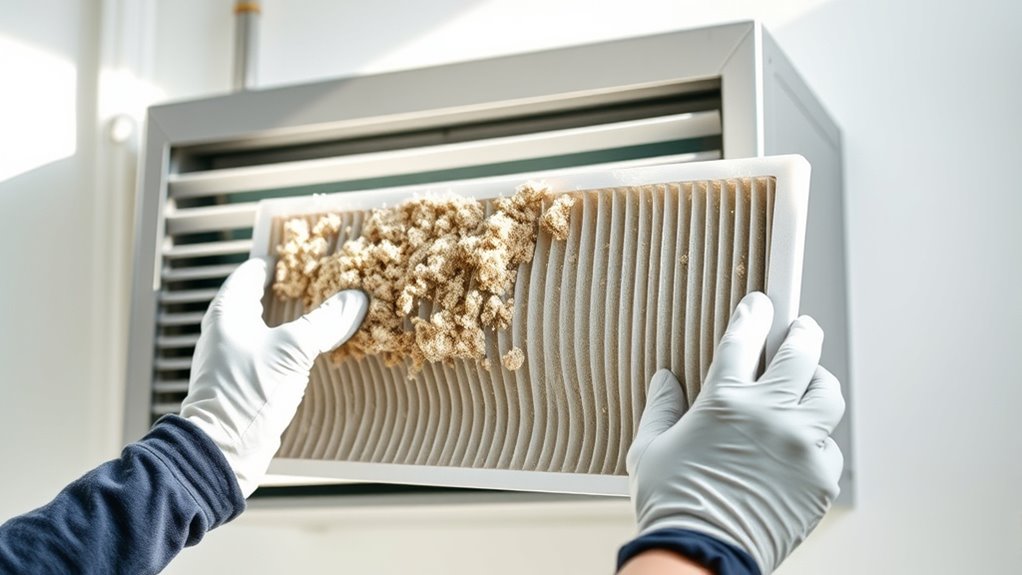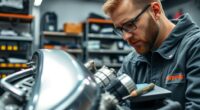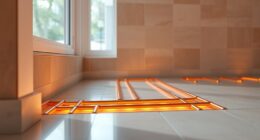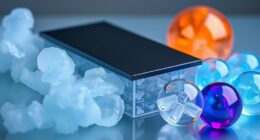To keep your heat pump running efficiently, check your filters monthly and replace or clean them when dirty. Disposable filters should be changed every 1 to 3 months, while washable ones can be cleaned regularly with water and mild detergent. Make sure they fit properly to maximize airflow and system performance. Regular maintenance prevents dust buildup, improves air quality, and reduces energy use. Keep going to find out more tips for effective filter care and system longevity.
Key Takeaways
- Check filters monthly during peak seasons and replace or clean as needed based on their condition.
- Wash washable filters with water and mild detergent, then dry thoroughly before reinstalling.
- Replace disposable filters every 1 to 3 months or when visibly dirty to maintain efficiency.
- Ensure filters fit snugly in their slots to prevent airflow restrictions and optimize system performance.
- Regular filter maintenance improves indoor air quality, reduces energy costs, and prolongs heat pump lifespan.

Regularly cleaning and replacing your heat pump filters is essential for maintaining efficient operation and indoor air quality. When you stay on top of air filter maintenance, you help ensure your system runs smoothly, uses less energy, and keeps your home healthier. Dirty filters restrict airflow, forcing your heat pump to work harder, which consumes more energy and increases your utility bills. By performing routine upkeep, you not only extend the lifespan of your equipment but also improve its overall efficiency. One of the simplest energy efficiency tips is to check your filters monthly, especially during peak usage seasons like winter and summer, and replace or clean them as needed.
Regularly check and replace your heat pump filters to improve efficiency and indoor air quality.
For filters that are washable, cleaning them regularly with water and a mild detergent can keep them functioning at their best. Once they’re dry, simply reinstall them, making sure they fit snugly in their slots. If your filters are disposable, mark your calendar to replace them every one to three months; this interval can vary depending on your home’s environment, pets, and allergy sensitivities. Using high-quality filters can also improve air quality and system performance, but remember that even the best filters need regular attention to stay effective.
Performing air filter maintenance is a straightforward task that yields immediate benefits. When filters are clean, airflow increases, reducing strain on the heat pump. This improves heating and cooling efficiency, helping you save money on energy bills. Additionally, clean filters trap fewer airborne pollutants, dust, and allergens, which benefits everyone’s respiratory health. If you notice your system isn’t heating or cooling as effectively, or if you see dust accumulation around the vents, it might be time to check your filters. Keeping them clean not only ensures your home remains comfortable but also prevents unnecessary wear on your heat pump components.
Incorporating these simple steps into your routine is an easy way to maximize your system’s lifespan and energy efficiency. Remember, the key to effective energy efficiency tips lies in consistency. Make a habit of inspecting your filters monthly, and don’t delay replacing or cleaning them when they’re dirty. This proactive approach guarantees your heat pump operates at peak performance, keeps your indoor air quality high, and helps you save money on energy costs. Ultimately, good air filter maintenance is a small effort with significant rewards, ensuring your home stays comfortable and your system runs efficiently for years to come. Additionally, maintaining clean filters contributes to system longevity, preventing costly repairs down the line.
Frequently Asked Questions
How Often Should I Schedule Professional Heat Pump Maintenance?
You should schedule professional heat pump maintenance at least once a year to guarantee peak performance. Regular maintenance helps extend the filter lifespan and keeps your system running efficiently. If you notice reduced airflow or increased energy bills, consider scheduling more frequent checkups. Staying on top of your maintenance schedule prevents costly repairs and ensures your heat pump operates smoothly during colder months.
Can I Clean the Filter With Household Cleaning Products?
Imagine your filter as a tiny, vital gatekeeper catching dust and allergens. You shouldn’t clean it with household cleaning products, as these can damage the filter’s delicate fibers and shorten its lifespan. Instead, gently vacuum or rinse it with water, then let it dry thoroughly. Proper cleaning preserves its effectiveness, keeps your heat pump running smoothly, and guarantees you breathe cleaner air every day.
What Are Signs My Heat Pump Filter Needs Replacement Sooner?
If you notice filter clogging or reduced airflow from your heat pump, it’s a sign you need to replace the filter sooner. When airflow decreases, your system works harder, wasting energy and causing potential damage. Regularly inspect the filter for dirt buildup or clogging, and replace it promptly to maintain efficiency and indoor air quality. Don’t wait until performance drops; proactive replacement keeps your heat pump running smoothly.
Are There Specific Filters Recommended for Different Heat Pump Models?
You can’t judge a book by its cover, so when choosing filters for your heat pump, focus on compatibility first. Different models often require specific filter sizes and types, so check your owner’s manual or consult your brand’s recommendations. Some trusted brands like Honeywell or Carrier are dependable, but always verify compatibility to guarantee peak performance. Using the right filter keeps your system running smoothly and extends its lifespan.
How Does Filter Quality Impact Overall Heat Pump Efficiency?
Filter quality directly impacts your heat pump’s efficiency by influencing airflow restriction and filter lifespan. High-quality filters ensure better airflow, reducing strain on your system, which saves energy and extends the filter’s lifespan. Conversely, low-quality filters may clog quickly, causing airflow restrictions that make your heat pump work harder, increasing energy costs and decreasing efficiency. Regularly replacing or cleaning good filters keeps your system running smoothly and efficiently.
Conclusion
Regularly cleaning or replacing your heat pump filters keeps your system running smoothly and saves you money. It’s a simple task that can prevent costly repairs and improve air quality. Think of it as giving your home a breath of fresh air—clean filters ensure comfort, while neglected ones can lead to breakdowns. So, take a few minutes now; your heat pump and your wallet will thank you for it.









